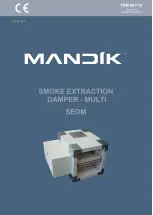
2
|
2
3 IMPLEMENTATION
3.1 TESTING AND REPORTING PROCEDURE
Basic testing and reporting procedure is set out in BESA publication SFG 20. This section is to inform
members of minimum requirements for testing and reporting. Additional procedures maybe required
by the client. All contractors need to have su
ffi
cient training to carry out mechanical work. Please
contact the BESA training department on
training.courses@theBESA.com
for support in the form of
a seminar, presentation or training course. Testing should include but is not limited to the following
steps.
✔
An inventory of all dampers to be tested.
✔
All Fire/Smoke dampers will be manually released to ensure the integrity of the spring loaded
shutter.
✔
The Fusible link should be inspected for any deformity or damage.
✔
The Fire/Smoke Damper will be cleaned and lubricated within the closed position.
✔
The Fire/Smoke Damper shall then be opened and re-set.
✔
Any severe corrosion found shall be reported to the client.
Reports should include but are not limited to the following items:
✔
Test results with client information including position within the building/system, date, and
name of operative shall be recorded and any comments noted if further action is required.
✔
Asset register to include damper location and ID number.
✔
Inspection results including details of failed damper operation.
✔
If drawings are provided, update and annotate details.
✔
Digital photographic evidence of damper condition prior to and after testing procedures un
less otherwise speci
fi
ed by client.
✔
Explanation of failed operation and recommended corrective or remedial action.
4 SCOPE AND ACKNOWLEDGEMENTS
TB/001 Fire and Smoke Damper Maintenance is designed to be used in conjunction with BESA publications which are
regularly reviewed by the BESA Technical Department to ensure they re
fl
ect current British, European and industry
standards. Please refer to BS9999 and HTM 03-01 for additional information. The BESA would like to thank members
of the Vent Hygiene Group for supplying content. All content correct at time of publishing.
Note
: this document is based on knowledge available at the time of publication and is meant for general purposes, not
for reliance on in relation to speci
fi
c technical or legal issues, in which case you should always seek independent advice.
No responsibility of any kind for any injury, death, loss, damage or delay however caused, resulting from the use of the
advice and recommendations contained herein, is accepted by the authors or others involved in its publication
(including the Building Engineering Services Association). 19/01/2016
TECHNICAL
BULLETIN
TB/001
FIRE AND SMOKE DAMPER MAINTENANCE





